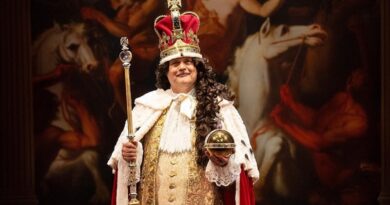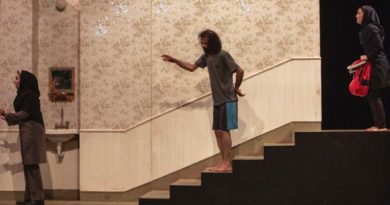“Metamorphosis” at Lyric Hammersmith
Neil Dowden in west London
11 February 2024
Frantic Assembly’s first new commission since the pandemic is an adaptation by Lemn Sissay of Franz Kafka’s 1915 novella Metamorphosis, with a tour ending in a month’s run at Lyric Hammersmith. This iconic fable of a man one day waking up to discover he’s transformed into an insect-like creature, who is then rejected and abused by his family and employer, lends itself well to the kind of physical theatre for which Frantic Assembly is renowned. And Sissay’s intriguing if rather over-wordy version does offer a different angle to the story in a dynamically staged show from co-founding artistic director Scott Graham.

Hannah Sinclair Robinson and Felipe Pacheco.
Photo credit: Tristram Kenton.
Kafka’s tale can be interpreted with varying emphasis on realism/fantasy and in relation to autobiography, psychology, politics, even prophetic history. Previous notable stage versions of Metamorphosis include a minimalist absurdist one by Steven Berkoff and David Farr’s adaptation for innovative Iceland theatre company Vesturport (staged three times at Lyric Hammersmith).
Poet/playwright Sissay puts a personal spin on Kafka’s tale inspired by his own background as a child put into care woefully let down by his foster family and social services (which he wrote about in his memoir My Name Is Why). Quite a bit of new material has been added, including descriptions of work trips abroad and a reference to greedy property developers with contemporary resonance. This Metamorphosis is not so much about an existential crisis as social breakdown. The result is a fascinating, if somewhat meandering, insight into how the rat race corrodes domestic relationships.
The show does not begin as the original does with Gregor Samsa’s “metamorphosis” – it starts with his sister Grete dreaming of becoming a fashion model like those on the covers of the magazines she reads, dressed in the clothes that Gregor makes a living from selling. There follows a “back story” in which we see the relentless work treadmill that Gregor is trapped into as a commercial traveller and sole breadwinner paying off the family debts. His transformation doesn’t happen until just before the interval – which neatly sets up the second half for revealing the tragic consequences.
Although Gregor’s mutation is often referred to as turning into some kind of bug, Kafka’s initial description in the original German literally translates as “monstrous vermin” – which has associations with anti-Semitism as well as low self-esteem. Here, Gregor’s changed state is certainly regarded with repulsion and disgust, leading to cruelty and violence, but his alienation as an outsider and sense of shame mainly stem from his inability to carry on single-handedly supporting his family economically – as he becomes a burden himself. It’s a burnout caused by an exploitative capitalist system that has dehumanizing effects. Sissay also hints at a quasi-incestuous relationship between Gregor and Grete, which taps into the revealed origins of Gregor’s background, suggesting a repressive paternal regime.

The ensemble.
Photo credit: Tristram Kenton.
There is a superbly choreographed repetitive sequence that speeds up when we see Gregor being ground down by his attritional daily routine. He starts off with lots of positive energy – “I am Gregor Samsa, and I love fabric” – hurriedly dressing before saying goodbye to his family as he heads off early to work, returning exhausted and having virtually no time or space to himself to rest before more of the same the next day – until he can’t continue. Interestingly, the Father’s movements later echo Gregor’s after he goes back to work himself. There is inventive use of a bed sheet to convey Gregor’s cocoon-like transformation, while another brilliant device is the chairs used to attack Gregor becoming his carapace.
Perhaps the most moving moment is when Gregor silently hugs Grete after he has attacked the Lodger for laughing at her awful violin-playing. However, it has to be said that the physical theatre doesn’t gel well with lengthy monologues.
Graham’s expressionist production is bolstered by Jon Bausor’s design of a seedy tenement room set at distorted angles and Simisola Majekodunmi’s moody lighting including flickering moth-like shadows on the ceiling, while Ian William Galloway’s video displays a collage of fashion magazine covers early on. Stefan Janik’s unsettling score featuring jagged piano motifs is complemented by Helen Skiera’s eerily atmospheric sound design.
Felipe Pacheco gives an impressively athletic performance as Gregor with his metamorphosis evoked in body language rather than physical appearance, crouching on all fours, hanging upside down from the light fitting or picture rail, and swinging from the lamp suspended from the ceiling. Hannah Sinclair Robinson cleverly suggests Grete’s own butterfly-like change from girl to woman as she poses in the mirror with a silk scarf, while her initial more sympathetic treatment of Gregor later turns to betrayal. The parents are not much more than caricatures, but they are entertainingly played by Troy Glasgow as the disciplinarian Father (with his boring repeated phrase “Beggars can’t be choosers”) and Louise Mai Newberry as the anxiously complaisant Mother. Joe Layton also does well doubling as Gregor’s intimidating, demanding boss the Chief Clerk and the condescending middle-class Lodger.
In 2024 Frantic Assembly celebrate 30 years of devised work and collaborations, including the multi-award-winning National Theatre production of A Curious Incident of the Dog in the Night-Time, as well as new plays by the likes of Bryony Lavery, Abi Morgan, and Mark Ravenhill. A year on from a revival of their trademark Othello set in a pub pool room it’s good to see them back at Lyric Hammersmith with a brand-new show as they look towards their fourth decade.









